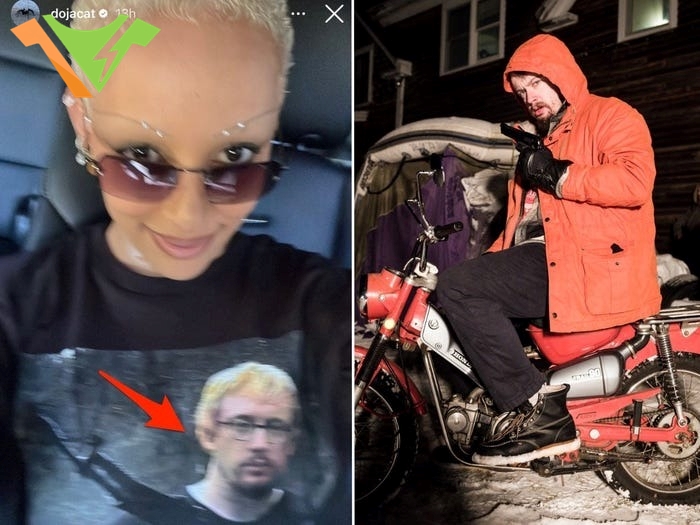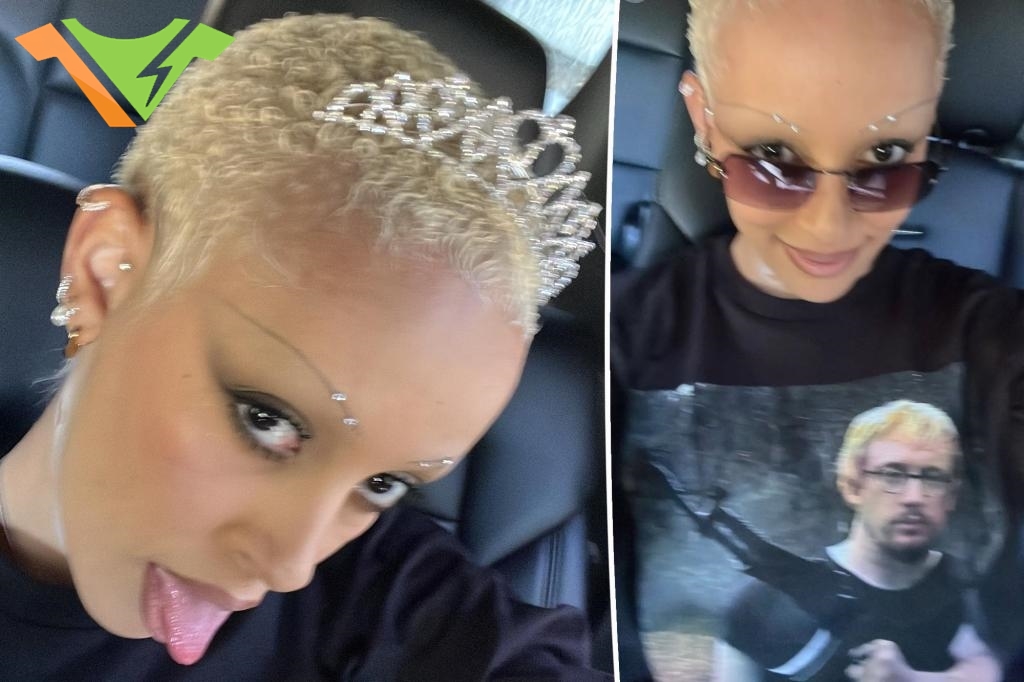News
Doja Cat Under Fire for T-Shirt Featuring Controversial Comedian — The ‘Doja Cat Sam Hyde T-Shirt’ Backlash Explained
Introduction: From Selfie to Storm
A single Instagram post sent ripple effects across social media and news outlets. In early October 2023, Doja Cat posted a selfie that drew fierce criticism—she was wearing a T‑shirt featuring comedian Sam Hyde, whose public associations with the alt-right and neo-Nazi imagery have long sparked controversy. The post was deleted, but not before igniting debates about celebrity responsibility, intent, and cultural awareness.
1. Who Is Sam Hyde—and Why Did His Shirt Spark Outrage?
Sam Hyde is a comedian known for co-creating the sketch comedy show Million Dollar Extreme Presents: World Peace. The show was canceled after one season on Adult Swim amid allegations of promoting racist and sexist content .
Critics have highlighted more troubling aspects of Hyde’s public persona: close ties to alt-right politics, documented donations to neo-Nazi platforms, and public displays of Nazi symbolism—including swastikas and a Nazi salute—sometimes alongside notorious internet troll Weev .
With Hyde’s associations making him a lightning rod, wearing his image became more than a fashion statement—it became a cultural flashpoint.
2. The Instagram Post: Sparks Fly (Then Flame Out)
Doja Cat shared a photo of herself wearing the image-laden T‑shirt during an Instagram Story, posted from her car. The shirt clearly displayed Sam Hyde’s face, prompting immediate backlash from fans and commentators who questioned the intent behind the choice
Several fans interpreted the move as politically loaded or sympathetic to extremist messaging. One viral social media comment captured the mood succinctly: “If you have alt‑right affiliations, you may as well be a nazi…” .
Quickly sensing the brewing controversy, Doja deleted that photo and replaced it—with Hyde cropped out and a stream of eye-roll emojis in its place

3. Reaction and Fallout: Fans, Media, and Context
The backlash wasn’t just widespread—it was pointed. Outlets like Billboard, XXL, and others covered the incident, emphasizing her association (whether implicit or not) with a figure known for extremist views
The narrative grew in complexity when fans dug into Doja’s past controversies—including her earlier involvement in online chatrooms with extremist users and lyrics criticized as racially insensitive . For skeptics, the shirt served as further evidence of a pattern.
4. Doja Speaks Out: “It’s Not an Attack”
Two months after the incident, Doja Cat addressed the uproar during an Apple Music interview with Ebro Darden. She stressed that her choice was not political:
“You can’t know everything… me wearing a T‑shirt of somebody I thought was funny is ‘an attack’? It’s not an attack.”
She emphasized that she is “not a political person,” and that her aim was simply to embrace “creativity and joy”—not to align with any ideology. She framed the entire narrative as an overreaction:
“There are people… who are always going to stand by ‘That person’s evil.’”
Her comments reflect a broader tension: does intent matter in public imagery—or is awareness enough to forego certain associations?
5. Cultural Responsibility: When Fashion Meets Ideology
This incident highlights a growing cultural expectation: celebrities and influencers are increasingly held accountable for the symbols they display—even unintentionally.
Whether it was a calculated statement or a misinformed fashion choice, the shirt sparked urgent questions:
- What responsibilities do public figures bear when adopting imagery connected to extremist movements?
- Should ignorance be an acceptable defense, or is that simply negligent?
- Do celebrities have a duty to vet every brand, image, or artist they reference?
In Doja’s case, the backlash suggests society expects more than excuse—it expects awareness.
6. Historical Echoes: Not the First Time for Doja
Doja’s past controversies added gravity to this moment. In 2020, she faced backlash for participating in online chatrooms associated with alt-right users, though she denied involvement in racist remarks and expressed regret . Earlier songs with contentious language also drew criticism, though she claimed they were attempts at reclaiming identity rather than endorsing slurs . These context layers made the Hyde image seem less accidental to many.
7. Broader Reactions: Commentary and Public Discourse
Reddit threads show fans debating intent versus impact. One user wrote:
“This man is an unrepentant neo‑Nazi… She knows this. Why add to the darkness in a world already at twilight?”
Others speculated on motives—clout, rebellion, or simple misjudgment—but the consensus was clear: there’s power in association, even unintentional.
8. Looking Forward: The Aftermath and Lessons Learned
In the months since, Doja has moved forward with new projects (like her album Scarlet and on-tour appearances), while media continues referencing the controversy as part of her complicated persona .
This episode stands as a cautionary tale—for her and other artists:
- Symbols communicate powerfully, regardless of intent.
- Online removal or edits aren’t enough to erase perception.
- Audiences—and media—are attentive to context, not just surface.
Conclusion
Doja Cat’s “Sam Hyde T-Shirt” controversy reveals how quickly a simple fashion choice can evolve into a cultural lightning rod. The image of a comedian with extremist ties—worn by one of pop’s most watched icons—sparked questions about intent, responsibility, and how far creative expression can go before it crosses into recklessness.
Doja insists she saw it as humor, not endorsement. But for many, symbols matter as much as intent—and in a world hyper-aware of coded messaging, that distinction is easier said than believed.
Would you like to explore more about the role of celebrity symbolism or how other public figures have navigated similar controversies?

